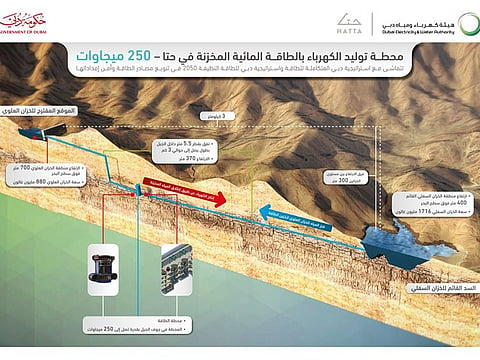250MW hydroelectric power plant rising in Dubai
Utility Dewa awards consultancy contract for the Dh1.92-billion Hatta hydroelectric project to France's EDF

Dubai Electricity and Water Authority (Dewa) has awarded the Dh58 million consultancy contract for the pumped-storage hydroelectric power station at Hatta Dam to France’s EDF.
The project is the first of its kind in the Arabian Gulf, with a total capacity of 250MW, and is expected to last between 60 to 80 years.
The consultancy contract covers design, hydro-geological, geological, environmental, geotechnical, and deep excavation studies.
It also includes consultancy on deep-water tunnel designs, the dam and hydroelectric power station, the tender for material supply, supervision of construction work, site installation, on-site testing and commissioning.
“The hydroelectric plant costs Dh1.92 billion. It is part of the Hatta Comprehensive Development Plan, launched by His Highness Sheikh Mohammed bin Rashid Al Maktoum, Vice President and Prime Minister of the UAE and Ruler of Dubai,” said HE Saeed Mohammed Al Tayer, MD & CEO of DEWA.
“We are working to achieve the UAE Vision 2021 to make the UAE one of the best countries in the world by 2021, supporting sustainable development, preserving natural resources and achieving economic, social and environmental development, in line with the aspirations of our wise leadership,” added Al Tayer.
1.7 billion gallons of water
Dewa will build the hydroelectric power station to generate electricity, by making use of the existing water stored in the Hatta Dam, which can store up to 1,716 million gallons, and an upper reservoir that will be built in the mountain that can store up to 880 million gallons.
The upper reservoir will be 300 metres above the dam level.
During off-peak hours, turbines that use clean and cheap solar energy will pump water from the lower dam to the upper reservoir.
During peak-load hours, when production costs are high, turbines operated by the speed of waterfall from the upper reservoir will be used to generate electricity and connect it to DEWA’s grid.
The efficiency of power production will reach 90% with a 90-second response to demand for electricity.
Sign up for the Daily Briefing
Get the latest news and updates straight to your inbox


